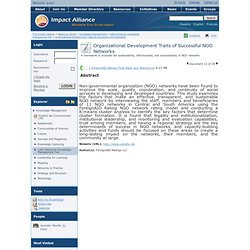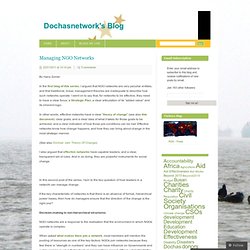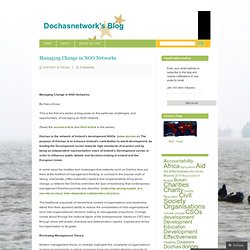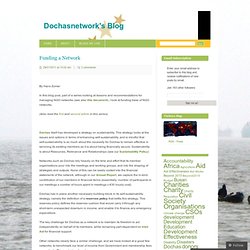

Lessons learned: NGO networks. Traits of Successful NGO Networks. Document 13 of 20 1 ForeignAID Ratings Final Paper and Reports.zip 8.23 MB Abstract Non-governmental organization (NGO) networks have been found to improve the scale, quality, coordination, and continuity of social services in developing and developed countries.

This study examines the factors that make an effective, transparent, and sustainable NGO network by interviewing the staff, members and beneficiaries of 11 NGO networks in Central and South America using the ForeignAID Rating NGO network rating model and conducting a K-means cluster analysis to identify the key factors that determine cluster formation.
Website (URL): Author(s): ForeignAID Ratings LLC. Success Competencies. Dilemmas for NGO networks. Managing NGO Networks. 22/01/2011 at 10:14 pm By Hans Zomer In the first blog of this series, I argued that NGO networks are very peculiar entities, and that traditional, linear, management theories are inadequate to describe how such networks operate.

I went on to say that, for networks to be effective, they need to have a clear focus: a Strategic Plan, a clear articulation of its “added value” and its inherent logic. In other words, effective networks have a clear “theory of change” (see also this document): clear goals, and a clear idea of what it takes for those goals to be achieved, and a clear indication of how those pre-conditions can be met. Effective networks know how change happens, and how they can bring about change in the most strategic manner. (See also Dóchas’ own Theory Of Change) I also argued that effective networks have capable leaders, and a clear, transparent set of rules.
In this second post of the series, I turn to the key question of how leaders in a network can manage change. Like this: Managing Change in NGO Networks. 21/01/2011 at 7:42 pm Managing Change in NGO Networks By Hans Zomer This is the first of a series of blog posts on the particular challenges, and opportunities, of managing an NGO network.

(Read the second article and third article in the series) Dóchas is the network of Ireland’s development NGOs. In some ways the realities and challenges that networks such as Dóchas face put them at the forefront of management thinking. The traditional popularity of hierarchical models of organisations and leadership stems from their apparent ability to reduce the complexities of intra-organisational (and inter-organisational) decision making to manageable proportions: Change comes about through the mythical figure of the entrepeneurial, hands-on CEO who through sheer will-power, charisma and determination cajoles, inspires and drives his organisation to its goals. Reviewing Management Theory. Monitoring & Evaluating Networks. Evaluating Social Change Networks.
Towards Effective Collaboration in Partnerships and Networks: Funding a Network. 29/01/2011 at 10:02 am By Hans Zomer In this blog post, part of a series looking at lessons and recommendations for managing NGO networks (see also this document), I look at funding base of NGO networks.

(Also read the first and second article in this series) Dóchas itself has developed a strategy on sustainability. This strategy looks at the issues and options in terms of enhancing self-sustainability, and is mindful that self-sustainability is as much about the necessity for Dóchas to remain effective in servicing its existing members as it is about being financially secure: Sustainability is about Resources, Relevance and Relationships (see our Sustainability Policy) Networks such as Dóchas rely heavily on the time and effort that its member organisations pour into the meetings and working groups, and into the shaping of strategies and outputs. Outside Ireland, the picture is equally mixed: What this little comparison shows, is that it is hard to compare NGO networks across borders.
Dóchas on Network Sustainability. Sustainability_Policy.